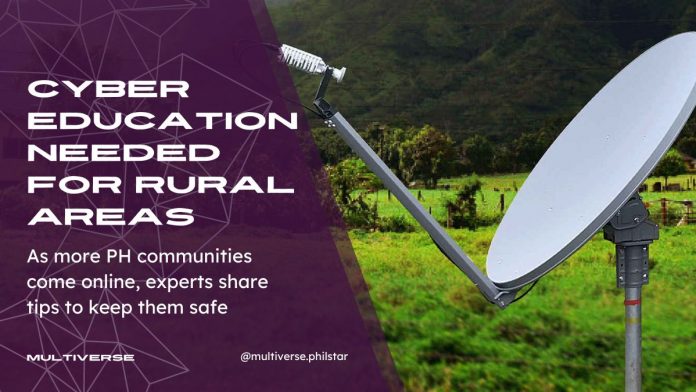As the Philippine government amplifies its efforts to connect geographically isolated and disadvantaged areas (GIDAs) to the internet, experts are emphasizing the importance of cybersecurity education. The goal: to ensure that these already disadvantaged communities, while being brought into the digital fold, are not further disadvantaged by potential cyber threats.
Bridging the digital divide
According to the Department of Information, Communication, and Technology (DICT), 65% of Filipinos, mostly families based outside of urban centers, still lack internet access. As such, the Philippine government made strong commitments this year towards connecting more of these communities to the internet. Under the current administration, multiple agencies have come together to provide free internet connection to rural communities through the “BroadBand ng Masa Programme”.
This initiative specifically targets isolated islands, especially those without mobile cellular connections. Today, nearly 5,000 operational free WiFi sites have been established, servicing around 2.1 million unique users across 100,000 families.
Additional cross-sectoral partnerships have also seen groups like Starlink, SES, Silkwave, Astranis, and other internet satellite providers come into the country to boost accessibility in rural regions.
Higher connectivity, higher risk
While the push for digital inclusion promises economic growth and opportunities in underserved regions, it also brings forth challenges related to cybersecurity. According to Palo Alto Networks’ 2023 Unit 42 Ransomware and Extortion Report, ransomware attacks in the Philippines surged by nearly 60%.
Oscar Visaya, Country Manager for the Philippines at Palo Alto Networks, emphasized the need for early education on best security practices, especially in GIDAs. “While [these communities] are gaining internet access, the greater challenge lies in shifting consumer behavior towards cybersecurity,” he said. “Many in these communities are unfamiliar with online risks. Early education on best security practices, such as Zero Trust, is vital for individuals and organizations within these areas.”
Zero Trust is a digital approach that never assumes safety; it always verifies. Think of it as a security guard, checking the IDs of those who come in and out of a building, regardless of whether they’re regulars or not. In enterprise settings, this translates to advanced security tools and protocols, like multi-factor authentication, to ensure only authorized users and devices can access specific data and applications. No person or platform is trusted implicitly; everything is scrutinized.
For individuals, especially those coming from GIDAs, adopting Zero Trust means learning to double-check links before clicking, especially in emails and on social media, to avoid phishing scams. They should also use strong, unique passwords for different accounts and enable multi-factor authentication wherever possible to add an extra layer of security.
A bottom-up approach to national security
Educating newly-connected communities is even more vital given the context that the main goal of programs like BBMP is to streamline interconnectivity and digitize access to government services. The vast amounts of data LGUs will be amassing through these services creates a goldmine for potential bad actors to target. A data breach within a public agency could jeopardize citizens’ privacy, public services, and even national security.
National and local government units can boost their online security by setting up more robust, granular systems to monitor their internet traffic, both in terms of the apps being used and the people using them. This way, they can quickly spot and address any unusual or suspicious activity. Moreover, by using tools that control who can access specific parts of their network (often called Identity and Access Management practices), they can better protect their systems from potential threats, ensuring everything runs smoothly and safely.
“Digital infrastructure’s economic potential hinges on effective preparedness against attacks that could cause financial losses, cost livelihoods, and endanger people’s safety at worst,” Visaya said. “By implementing robust cybersecurity measures from the outset, attack surfaces shrink and pave a path for sustainable growth that benefits everyone in the long term.”


